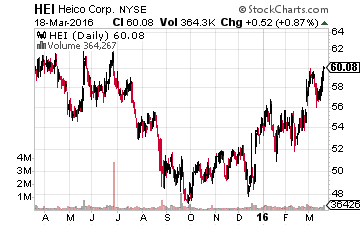This Will Be The Next Bear Market Sector
It all started back in 2008 when the industry was hit with ultra-high oil prices and tightening credit markets. This helped keep new players out of the industry and capacity in check — so no oversupply or pressure on pricing.
At the same time, high fuel costs lead to a wave of consolidation in the industry. Delta Airlines (NYSE: DAL) bought out Northwest in 2008, then United Airlines (NYSE: UAL) merged with Continental in 2010, Southwest (NYSE: LUV) purchased AirTran in 2011, and, finally American Airlines (NYSE: AAL) combined with US Airways in 2013. Now, these four airlines control 80% of the U.S. airline market.
Major airlines enjoyed a number of “good” years, with shares of Delta, United, and Southwest up more than triple the S&P 500 over the last five years.
Then, hedge funds and investment banks caught onto the story. Wall Street even created an exchange-traded fund last year to take advantage of the hype, the U.S. Global Jets ETF (NYSE: JETS). Funds have piled into airlines and started pumping the industry hype to retail investors. However, since then, airlines have been relatively dead money.
Shares of United Airlines have tumbled 14% in the last year and American Airlines has fallen 22%. But there’s still a lot of smart money in the names, yet, when investors realize that airline investing is still a fairy tale (just as it was for so many decades), there will be a mass exodus. This will put even more downward pressure on the space.
This comes as the promise of low oil as a tailwind for airlines hasn’t really worked out. Soon, airlines will fall back into their old ways of competing on price, which means lower prices for consumers, as well as lower margins for airlines. So, in a way, the extreme consolidation has taught the remaining players nothing.
What’s more is that consolidation doesn’t always work, case in point is United Airlines. This is the airline whose CEO recently returned to work after suffering a heart attack and getting a subsequent heart transplant.
United is now facing pressure from activist investors, which comes as it has been one of the biggest laggards in the industry. The merger with Continental in 2010 hasn’t gone as smoothly as expected and cost synergies have been nonexistent.
Still, for all this negativity, air travel is a steadily growing business. But, if you’re really looking for that airline-type exposure, try looking at the aircraft parts makers. There are plenty of pure plays in the parts business that will give you exposure to airlines, without the hype and cutthroat competition.
Best Airline Play No. 1: TransDigm Group (NYSE: TDG)

TransDigm makes various airline parts, from engine sensors, lighting systems, overhead bin latches to lavatory faucets. These specialty parts add up quickly. They wear out over time and need to be replaced, which provides TransDigm with a steady stream of cash flows that is not susceptible to oil prices and the broader economy. Plus, it calls the world’s two biggest airline makers major customers --Boeing (NYSE: BA) and Airbus.
The unique thing about TransDigm is that it’s been a serial acquirer in the airline parts business, using its strong free cash flow to buy up the smaller parts markets. With that, TransDigm has been resilient against a weak airline and broader market and is up 5% over the last year.
Best Airline Play No. 2: HEICO (NYSE: HEI)

HEICO is another major player worth looking into. It makes and sells FAA-approved replacement airline engine parts. A unique market and one that HEICO owns; it’s the world’s largest maker of FAA-approved airline engine and component parts.
Its advantage lies in its ability to make replacement parts and sell them for lower prices than the original equipment manufacturers can. It has a solid balance sheet, double-digit profit margins and 12% return on invested capital.
In the end, airlines were a great trade for a number of years. It’s too bad that Wall Street and many investors didn’t catch on until too late. There’s virtually no catalysts on the horizon that could push the industry higher — oil prices are already at historical lows, virtually no additional mergers would get approved, there’s no “rebound” in people flying as the economy and employment are already back at robust levels.
However, airlines will continue to run flights, with a slight increase in global air traffic expected for 2016. With that, as long as there are planes in the sky, the airline parts makers are worth a look for investors looking to tap a steady and underrated market.
Disclosure: You could collect an average of $3,268 in extra monthly cash with ...
more


